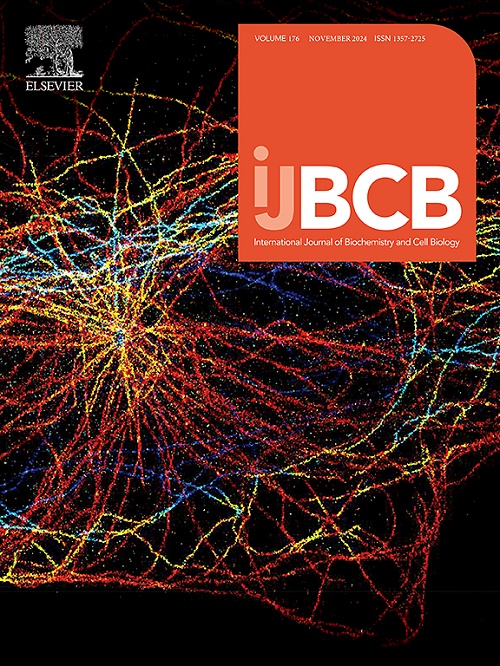Cofilin is a key regulator of oxidative stress-induced intercellular tunneling nanotubes formation
IF 2.8
3区 生物学
Q2 BIOCHEMISTRY & MOLECULAR BIOLOGY
International Journal of Biochemistry & Cell Biology
Pub Date : 2025-06-09
DOI:10.1016/j.biocel.2025.106820
引用次数: 0
Abstract
Tunneling nanotubes (TNTs) are open membranous channels between connected cells, TNTs-mediated substance transfer between tumor cells plays an important role in drug resistance, metastasis and recurrence of tumors. This study aims to explore the composition of TNTs between tumor cells and the function of cofilin in TNTs formation. Oxidative stress induces the formation of TNTs between tumor cells. The components of TNTs include microfilaments and cell membranes, some of which contain microtubules, as well as mitochondria, endoplasmic reticulum, lysosomes, lipid droplets, ions, etc. Förster resonance energy transfer (FRET) analysis of living cells showed that cofilin and actin only interact in TNTs, and inhibition of cofilin can suppress oxidative stress-induced TNTs production. Doxorubicin (DOX) induced senescent tumor cells (STC) can form TNTs, and TNTs mediated material transfer between STC can promote tumor cell survival, while inhibition of cofilin can promote STC death. In summary, our data suggests that cofilin plays an important role in the formation of TNTs, and targeted inhibition of TNTs mediated intercellular communication and material exchange holds significant potential as a novel cancer treatment strategy.
Cofilin是氧化应激诱导的细胞间隧道纳米管形成的关键调节因子
隧道纳米管(TNTs)是细胞间开放的膜通道,其介导的肿瘤细胞间物质转移在肿瘤的耐药、转移和复发中起着重要作用。本研究旨在探讨肿瘤细胞间TNTs的组成及cofilin在TNTs形成中的作用。氧化应激诱导肿瘤细胞间形成tnt。tnt的成分包括微丝和细胞膜,其中一些含有微管,还有线粒体、内质网、溶酶体、脂滴、离子等。Förster活细胞的共振能量转移(FRET)分析表明,cofilin和actin仅在tnt中相互作用,抑制cofilin可以抑制氧化应激诱导的tnt的产生。多柔比星(DOX)诱导的衰老肿瘤细胞(STC)可形成tnt, tnt介导的STC间物质转移可促进肿瘤细胞存活,抑制cofilin可促进STC死亡。总之,我们的数据表明,cofilin在TNTs的形成中起着重要作用,靶向抑制TNTs介导的细胞间通讯和物质交换具有作为一种新的癌症治疗策略的巨大潜力。
本文章由计算机程序翻译,如有差异,请以英文原文为准。
求助全文
约1分钟内获得全文
求助全文
来源期刊
CiteScore
8.10
自引率
0.00%
发文量
124
审稿时长
19 days
期刊介绍:
IJBCB publishes original research articles, invited reviews and in-focus articles in all areas of cell and molecular biology and biomedical research.
Topics of interest include, but are not limited to:
-Mechanistic studies of cells, cell organelles, sub-cellular molecular pathways and metabolism
-Novel insights into disease pathogenesis
-Nanotechnology with implication to biological and medical processes
-Genomics and bioinformatics

 求助内容:
求助内容: 应助结果提醒方式:
应助结果提醒方式:


